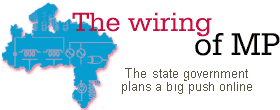

|
|
|
|
| HOME | INFOTECH | HEADLINES | |||
|
January 29, 2000
HEADLINES
|

Rahul Singh Next time you halt at a rustic hamlet in Madhya Pradesh, and wonder whether you'll get a phone to contact home, you might have some occasion to be surprised: You might get an cybercafe instead.
Intranet, note, not Internet. A beginning has already been made in the tribal districts of Dhar and Chhindwara. The 21 rural cyber cafes which started functioning from January this year in Dhar, western Madhya Pradesh, are already providing everything from the prices of agricultural produce in different markets to copies of land and revenue records and maps to the villagers. The villagers can also email their applications for income, domicile, caste and various other certificates that they need from time to time, lodge a complaint about a broken hand pumps or poor quality of seeds and fertilisers, the absence of teachers, the irregularity in mid-day meals in schools... Dhar has already connected three primary health centres with the M Y Medical College Hospital at Indore. The PHC doctors can seek expert advice through email. Patients referred to the M Y Hospital can obtain appointments in advance. All this, of course, in the local language -- Hindi and almost at zero cost to the state exchequer. But why not the Internet itself? Answers state Sunil Kumar, Information Technology Secretary: "There are sensitive government data relating to land records. Having a secure system can shield us from hackers." Users have to pay a modest fee -- ranging from Rs 5 to Rs 10 -- for the services. "The volume generated will be so great that its revenue can attract more and more private entrepreneurs to open these information kiosks," says Sunil Kumar. Government departments like health centres, schools and rural panchayats can use the system free of cost. In Vidisha, near Bhopal, the scheme has generated so much enthusiasm that some IIT graduates from Madhya Pradesh have taken lines from the infotech firms they work for in Bangalore and Hyderabad to set up the district network. The government will sign MOUs with private entrepreneurs to open these kiosks and then charge the owners 10 per cent of the total revenue. The Madhya Pradesh government is also setting up, in association with C-DOT, an institute for addressing problems relating to use of Hindi computing. The government will also encourage NGOs to establish block level centres to provide hardware, software and other support services. Simultaneously, the union government's rural development department has framed a Rs 70 million project to promote IT in the rural areas. The project has picked up pace in three districts -- Hoshangabad, Narsinghpur and Raisen. Under the project, a multimedia computer worth Rs 50,000 is to be installed in each of the 1,300 village panchayats of the three districts. The panchayats would be connected with the nicnet network. The villages of Dhar are already reaping the benefits of networking. The farmers of Bagadi village were getting Rs 300 per quintal for their potato crop from local traders. They paid Rs five at the local cybercafe to access the current rates at other places. And were soon selling potatoes in Indore at Rs 400 per quintal. The more enterprising ones sold their produce in Bombay where the rate is Rs 900 per quintal. Time-assured action on emailed application and complaint has made the system popular in the rural community. Earlier the villagers were forced to make several time-consuming and expensive trips to the district or sub-divisional headquarters to get their work done. Now it needs only one trip to the cybercafe. The cybercafes also helps contain corruption at the lower levels. The farmers can now get a copy of the land record or map without paying officials any bribe. This is important since farmers needs copies of current land records or maps to procure loans about twice every year. The Dhar experiment took off with a modest fund of Rs 2.5 million with 21 kiosks. In contrast, wiring 45 villages in Warana, Maharashtra, cost Rs 25 million. Says Kumar: "Unlike Warana, which used VSAT, we depended on existing telephone lines." In Dhar, the rural cyber cafes are mostly situated in the buildings of village panchayats, which got computers and other hardware from the district panchayat. The village panchayats arrange for telephone and electric connections and hand over the booths on a contract basis to the local educated unemployed. Naturally, it works better and the fruits of planning are beginning to show... |
|
HOME |
NEWS |
BUSINESS |
SPORTS |
MOVIES |
CHAT |
INFOTECH |
TRAVEL |
SINGLES BOOK SHOP | MUSIC SHOP | GIFT SHOP | HOTEL RESERVATIONS | MONEY EDUCATION | PERSONAL HOMEPAGES | FREE EMAIL | FEEDBACK |